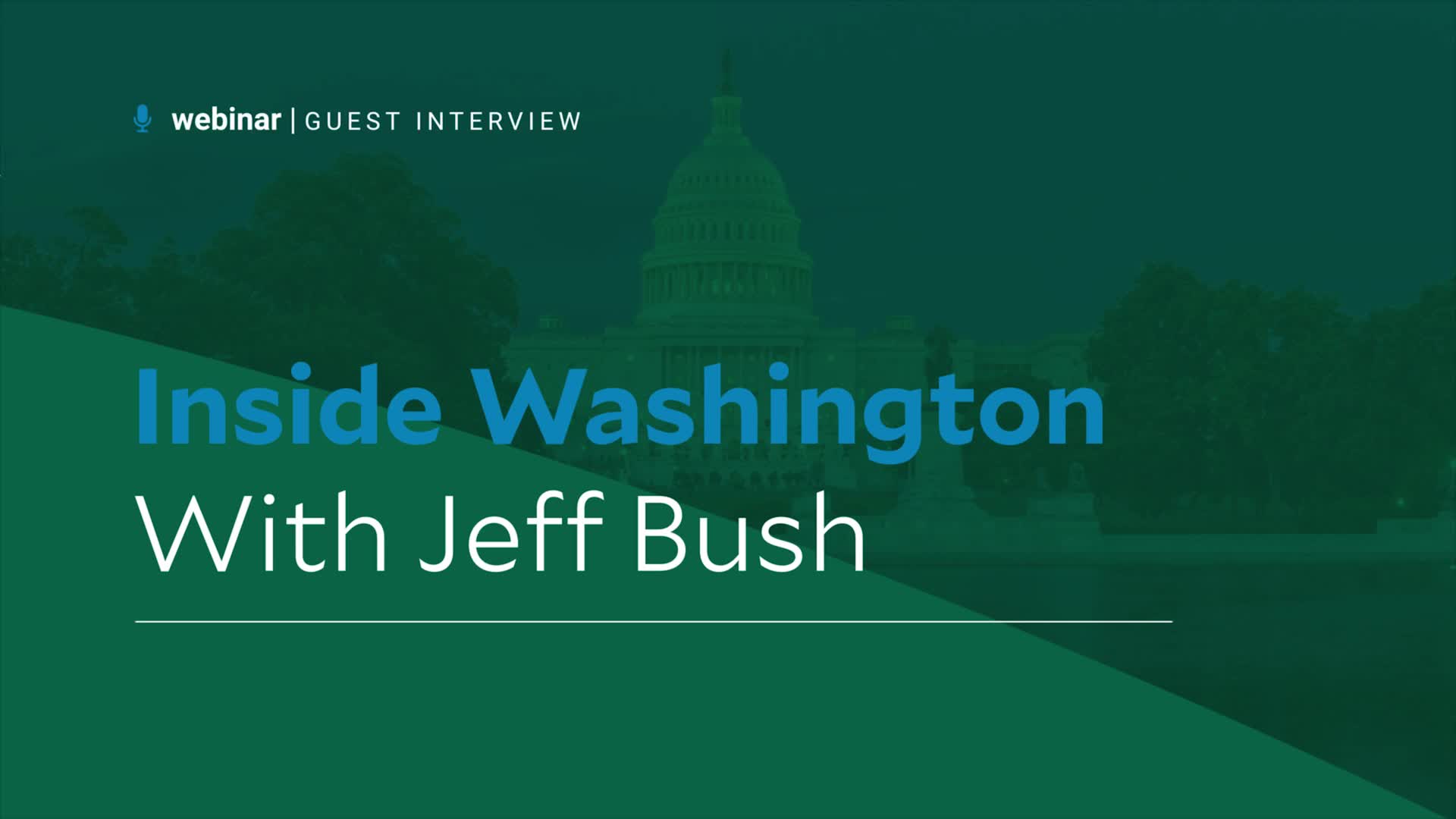Inside Washington With Jeff Bush
Decisions made in the nation’s capital are shaping financial markets like never before. Get insight on policy developments that could impact financial outcomes from a nonpartisan expert on all things Washington

Back by popular demand, Jeff Bush, principal of The Washington Update, shared his expertise on policy and politics and what it could all mean for investors.
The federal budget, tariffs and trade, monetary policy, the midterm elections, Social Security and unexpected provisions in the One Big Beautiful Bill are just a few of the topics Jeff weighed in on.
Watch now.

Originally broadcast September 25, 2025
Key Takeaways
Edited excerpts from our conversation with Jeff Bush.
Fiscal Challenges
If you want to get our country back on a more solid fiscal footing, you can't tax enough, cut enough or grow fast enough to do it. It's going to take elements of all three of those things. And right now, politically, we need to give our politicians enough space to come to the recognition that maybe revenues actually have to go up a bit—and we can have a great debate on how. But just as a percentage of gross domestic product (GDP), taxes need to go up a bit, and spending needs to come down. The combination of those two things could drive additional economic growth.
Higher Long-Term Interest Rates?
At some point, buyers of U.S. debt are going to say, “United States, I love you, but you're choosing to take on additional balance sheet risks, and I deserve something in exchange—higher yields.” While the Federal Reserve (Fed) may drive down short-term rates, buyers of debt drive long-term rates. That's a major risk.
The Path of Monetary Policy
At this point, the next Fed chair will be President Trump’s appointment, and he has a very friendly Senate to confirm that person. My assumption is that it will be someone who's a little more ideologically synergistic with the administration. We’re already on the trajectory of a lowering rates cycle through 2026. It might mean they get a little more aggressive about it.
Manufacturing Renaissance?
The idea that we will bring back manufacturing jobs—putting this nut on that bolt 250 times a day—that type of manufacturing probably is not coming back. But when we're talking about chip manufacturing, data center construction and the new economy, then I think it’s realistic that the $2 trillion plus of investments companies and countries have pledged to make in the U.S. will happen. A lot of those commitments were already in the books, in business plans. Companies saw a value in bringing that manufacturing to U.S. shores even before President Trump took office. Now you could argue that it's certainly a little sweeter to bring production onshore—that’s certainly not missed by the CEOs.
Deregulation Discussions
I tell audiences every day, it takes just as long to deregulate as it takes to regulate, and it's a long, slow process. Reasonably, we shouldn’t expect to feel a lot of deregulatory efforts until at least late this year or even the end of 2026. Now let's play out that game. Let's say that the Republicans lose control of the House of Representatives in the midterm election. You could see President Trump triple down on deregulation because it's one thing he can still control without legislative help.
Overlooked Opportunities
Bonus Depreciation: No. 1 Driver of Growth
By far, no doubt about it, the No. 1 driver of economic growth inside the bill was bonus depreciation, which allows business owners and corporations to write off capital investments in the year they make them. Previously, business owners would have to amortize those over a number of years, which made it a little more difficult than going out with that cash in a single year. Now it's not as hard a decision.
Bipartisan ROAD to Housing Act
[To address the housing issue.] We have to get more supply out there, and the ROAD bill is designed to do that—unlock the supply side by incentivizing builders, especially multifamily—and first-time home-buyers—trying to build out that base of the housing market. It has bipartisan support. I think the odds are that they'll try to address that before year-end, but you can hear trepidation in my voice.
Directing Tax Dollars to Scholarships
I think this is a fun part that came out of the One Big Beautiful Bill. Let's say you have a $10,000 federal tax liability. You can go to the federal government and say, “Federal government, I don't like how you spend my money, so I'm going to take $1,700 of what I owe you and give it to a scholarship-granting organization in my state.” It's a dollar-for-dollar transfer to an organization in your state that provides scholarships to maybe needy families for private and public education.
Maybe [an institution] needs to build a new theater, a new football field or a new aquatics facility. It could apply scholarship-granting organization money to that. So, it allows the taxpayer to take a little bit of their federal tax liability, $1,700, and put it towards something that they think is a better use of their money. A lot of states have scholarship-granting organization tax credits as well. So, you could see some layering of those tax credits, and it’s really dollar-for-dollar. It doesn't cost you anything. You might as well take control of it.
Stay on Top of Current Market Events
Read our latest views on government policy and financial markets.
The views expressed in this presentation are the speaker’s own and not necessarily those of American Century Investments. This presentation is for general information only and is not intended to provide investment, tax or legal advice or recommendations for any particular situation or type of retirement plan. Please consult with a financial, tax or legal advisor on your own particular circumstances.
Jeff Bush and The Washington Update are not affiliated with American Century Investments.
IRS Circular 230 Disclosure: American Century Companies, Inc. and its affiliates do not provide tax advice. Accordingly, any discussion of U.S. tax matters contained herein (including any attachments) is not intended or written to be used, and cannot be used, in connection with the promotion, marketing or recommendation by anyone unaffiliated with American Century Companies, Inc. of any of the matters addressed herein or for the purpose of avoiding U.S. tax-related penalties.
This information is for educational purposes only and is not intended as tax advice. Please consult your tax advisor for more detailed information or for advice regarding your individual situation.